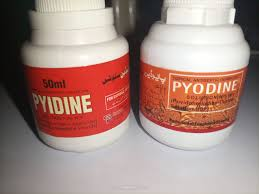A popular antiseptic solution Pyodine uses for disinfecting wounds and preventing infections. It contains povidone-iodine, an active ingredient that is well-known for its effectiveness against a wide range of bacteria, viruses, fungi, and protozoa. Pyodine serves as a reliable product for cleansing and treating minor cuts, burns, and other skin injuries.

What is Pyodine?
Pyodine is an antiseptic solution containing povidone-iodine, a compound made by combining iodine and polyvinylpyrrolidone. Pyodine uses in liquid form to prevent and treat infections in wounds, burns, and minor skin injuries. The iodine in Pyodine works by gradually releasing free iodine, which disinfects the skin and kills harmful microorganisms like bacteria, viruses, and fungi.
Pyodine uses
Pyodine has a variety of applications in medical and household settings. Here are Pyodine uses:
- Wound Care:
- Used to clean and disinfect minor cuts, scrapes, and burns.
- Prevents bacterial infections and aids in faster healing.
- Surgical Preparation:
- Applied to the skin before surgeries to sterilize the area.
- Used by medical professionals as a disinfectant during procedures.
- Treatment of Skin Infections:
- Effective against conditions like impetigo, boils, and fungal infections.
- Oral Care (in diluted form):
- Can be used as a gargle or mouthwash to treat throat infections and mouth ulcers.
- Personal Hygiene:
- Often used to clean piercings or tattoos to prevent infections.
How to Pyodine uses
Proper usage ensures the effectiveness of Payodine while minimizing side effects. Here’s how to use it:
- Clean the Area: Before applying, clean the affected area with water and dry it gently.
- Apply the Solution: Use a cotton swab or clean hands to apply a thin layer of Payodine.
- Do Not Cover Immediately: Allow the solution to dry unless instructed by a healthcare provider.
- Dilution for Oral Use: If using it as a mouthwash, dilute Pyodine with water as directed on the label or by your doctor.
Effects of Pyodine
Benefits:
- Broad-Spectrum Action: Works against bacteria, viruses, and fungi.
- Fast Acting: Quickly reduces the risk of infections.
- Safe for Most Skin Types: Suitable for use on intact or broken skin.
Side Effects:
While generally safe,Pyodine uses may cause side effects in some individuals, such as:
- Skin Irritation: Redness, itching, or rash at the application site.
- Allergic Reactions: Rare but may include swelling, severe itching, or difficulty breathing.
- Thyroid Issues: Prolonged use may affect thyroid function due to iodine absorption.
If you experience any severe side effects, discontinue use and consult a healthcare professional immediately.
Precautions of Pyodine uses
To ensure safe and effective Pyodine uses, keep the following precautions in mind:
- Avoid Prolonged Use:
- Prolonged or excessive application can lead to skin irritation or iodine overload.
- Not for Deep Wounds:
- Avoid using Payodine on deep wounds or large burns without medical advice.
- Allergy Check:
- Perform a patch test if you’re using it for the first time to ensure you’re not allergic.
- Pregnancy and Breastfeeding:
- Consult your doctor before using Pyodine uses during pregnancy or while breastfeeding.
- Children:
- Use Payodine cautiously on children and only under medical supervision.
- Interaction with Other Medications:
- Inform your doctor if you’re using other topical treatments to avoid adverse interactions.
Storage and Handling
- Keep Away from Children: Store Payodine in a secure place.
- Room Temperature: Store at room temperature and away from direct sunlight.
- Do Not Freeze: Freezing may reduce its effectiveness.
FAQs About Payodine
1. Can Pyodine uses on open wounds?
- Yes, it is safe for minor open wounds, but avoid applying it to large or deep wounds without consulting a doctor.
2. How often can I use Pyodine?
- It’s best to follow the instructions on the label or your doctor’s advice. Usually, 2-3 times daily is sufficient.
3. Is Pyodine uses safe for pets?
- Payodine can be used on pets for minor wounds, but consult a veterinarian first.
4. What should I do if Pyodine uses causes irritation?
- Stop using it immediately and rinse the area with water. Seek medical advice if irritation persists.
if you have any question you can contact us!
Disclaimer
The information on this page is merely supplemental. The information provided here is not intended to replace the counsel of a licensed physician. This page does not recommend that using this medication is appropriate or safe. Therefore, before taking this medication or any other medication, it is recommended that you consult your doctor.
Also read: Vidaylin Syrup: Uses, Benefits, Side Effects and Complete Guide


[…] Pyodine: Uses, Effects, and Precautions a Complete detail […]
[…] Pyodine: Uses, Effects, and Precautions a Complete detail […]